Claude vs. ChatGPT: Choosing the best AI for your SEO needs
What happens when you pit some of the most popular AIs, ChatGPT and Claude, against real SEO challenges?
In this article, we’ll explore their strengths and weaknesses in common SEO use cases, including content creation, technical SEO tasks (like schema markup generation), SEO performance analysis, and more.
By the end, you’ll have a clear understanding of how each AI performs and practical tips on choosing the best one for your SEO tasks.
Let’s dive in.
-
ChatGPT has vast knowledge and can give detailed answers, but it may sometimes generate incorrect or outdated information (hallucinations). Claude is generally more cautious and factual, with fewer wild guesses. Still, neither is 100% accurate, so fact-check important SEO data from any AI output.
-
ChatGPT excels at creative, dynamic writing and can adapt to many tones or styles, which is great for brainstorming catchy titles or unique angles. Claude produces very clear, well-structured content with a natural tone, which is ideal for long-form articles. Still, Claude may not be as “flashy” in idea generation.
-
ChatGPT can write and even execute code for SEO tasks (e.g., creating scripts, analyzing data). It also has a web browsing option to fetch current information. Claude can ingest and analyze large amounts of text (with a context window up to 200k+ tokens), making it excellent for reviewing long reports or a list of articles at once.
-
ChatGPT offers a widely used API and many integrations. Claude also has an API that handles very large inputs, but it’s newer to the market with fewer third-party integrations so far.
-
Both have a free version and a $20/month premium plan. ChatGPT Plus ($20/mo) gives you access to GPT‑4.5 (its largest model yet), GPT‑4.1 (a model optimized for coding tasks), as well as deep research and multiple reasoning models. Claude Pro ($20/mo) gives you access to Claude’s latest model with expanded limits (at least 5x the usage compared to its free service).
-
ChatGPT is best if you need a versatile AI for a variety of tasks (from creative content and social posts to coding help and real-time data). Claude is best if you work with very large texts or need an AI that stays on track and factual (great for long content drafts, detailed analysis, and maintaining context over lengthy conversations).
-
In practice, many SEO professionals use both ChatGPT and Claude: for example, ChatGPT to generate ideas or small scripts, and Claude to refine content or analyze big documents.
Claude vs. ChatGPT for SEO: Side-by-side comparison
ChatGPT and Claude are both conversational AI models that assist users by generating human-like text responses to a wide range of queries and tasks. At a high level, here’s how they compare:
- ChatGPT is developed by OpenAI. It’s known for its versatile writing style and creativity. SEO pros often use ChatGPT to brainstorm content ideas, draft engaging copy, or get quick answers thanks to its training on a wide array of internet text.
- Claude is developed by Anthropic and is often praised for its clarity and depth. The tool’s answers tend to be very detailed and structured, which is a boon for technical SEO tasks or lengthy analyses. It can handle a much larger prompt or document input than ChatGPT.
To see the differences at a glance, here’s a detailed Claude vs. ChatGPT comparison based on key SEO capabilities:
ChatGPT (OpenAI)
Excellent for generating content ideas, building detailed content briefs, creating blog post drafts, writing compelling meta descriptions, and coming up with catchy, SEO-optimized title ideas.
Claude (Anthropic)
Excellent for in-depth analysis, long-form content enhancement, and generating extensive reports or documentation (e.g., parsing an SEO audit and summarizing findings).
ChatGPT (OpenAI)
Capable of writing code snippets (HTML, JSON-LD, etc.) and giving concise explanations; might need chunking for very large data sets due to input size limits.
Claude (Anthropic)
Excels at technical tasks like schema markup generation and log analysis, often providing step-by-step or expanded answers; can intake very large data (long context window) in one go.
ChatGPT (OpenAI)
Widely adopted API; easy integration into CMS and workflows. Rich ecosystem of plugins and third-party add-ons (thanks to OpenAI’s popularity).
Claude (Anthropic)
API available (newer ecosystem). Fewer off-the-shelf integrations yet, but can leverage its large context in custom solutions. Great for feeding in lots of data via API for analysis.
ChatGPT (OpenAI)
Yes, ChatGPT (Free) uses a slightly lower-power model (GPT‑4.1 mini). Still useful for many tasks, but not as nuanced as its premium models.
Claude (Anthropic)
Yes, Claude has free access (through its website or other platforms) with some usage limits. Full capability (like 200K token context processing) may be restricted under the free tier.
ChatGPT (OpenAI)
ChatGPT Plus – $20/month. Extended limits on messaging, file uploads, data analysis, and image generation. Access to deep research and multiple reasoning models, and beta features.
Claude (Anthropic)
Claude Pro – $20/month. Higher usage limits and priority access to Claude’s latest model. Can process very large documents and conversations with fewer restrictions.
ChatGPT (OpenAI)
ChatGPT is less effective when handling big datasets, running detailed audits, or doing in-depth analysis on its own. Plus, it may occasionally “hallucinate” facts.
Claude (Anthropic)
No direct internet access or live data lookup. Tends to produce very verbose answers (which can be overkill for simple tasks). Fewer community integrations (as of now) compared to ChatGPT.
Excellent for generating content ideas, building detailed content briefs, creating blog post drafts, writing compelling meta descriptions, and coming up with catchy, SEO-optimized title ideas.
Excellent for in-depth analysis, long-form content enhancement, and generating extensive reports or documentation (e.g., parsing an SEO audit and summarizing findings).
Capable of writing code snippets (HTML, JSON-LD, etc.) and giving concise explanations; might need chunking for very large data sets due to input size limits.
Excels at technical tasks like schema markup generation and log analysis, often providing step-by-step or expanded answers; can intake very large data (long context window) in one go.
Widely adopted API; easy integration into CMS and workflows. Rich ecosystem of plugins and third-party add-ons (thanks to OpenAI’s popularity).
API available (newer ecosystem). Fewer off-the-shelf integrations yet, but can leverage its large context in custom solutions. Great for feeding in lots of data via API for analysis.
Yes, ChatGPT (Free) uses a slightly lower-power model (GPT‑4.1 mini). Still useful for many tasks, but not as nuanced as its premium models.
Yes, Claude has free access (through its website or other platforms) with some usage limits. Full capability (like 200K token context processing) may be restricted under the free tier.
ChatGPT Plus – $20/month. Extended limits on messaging, file uploads, data analysis, and image generation. Access to deep research and multiple reasoning models, and beta features.
Claude Pro – $20/month. Higher usage limits and priority access to Claude’s latest model. Can process very large documents and conversations with fewer restrictions.
ChatGPT is less effective when handling big datasets, running detailed audits, or doing in-depth analysis on its own. Plus, it may occasionally “hallucinate” facts.
No direct internet access or live data lookup. Tends to produce very verbose answers (which can be overkill for simple tasks). Fewer community integrations (as of now) compared to ChatGPT.
ChatGPT for SEO: In-depth look
ChatGPT is an AI chatbot by OpenAI that gained popularity for its ability to generate human-like text on almost any topic. For SEO professionals, ChatGPT can be a multi-purpose assistant:
- Creative and engaging copy. ChatGPT is highly effective at generating persuasive, on-brand copy across a range of formats. Particularly, it can craft ad copy, write catchy headlines, draft promotional emails, and even generate articles that resonate with audiences. When paired with SE Ranking’s Content Creation Tool, this content can be optimized for SEO to boost visibility and performance..
- Quick, iterative content ideation. When you need to brainstorm at scale, ChatGPT is a powerful asset. It can generate multiple variations of social media posts, landing page headlines, or blog titles in seconds. This speeds up A/B testing, creative sprints, and content development, giving teams more options to test and refine quickly.
- Content repurposing and adaptation. ChatGPT helps marketers stretch the value of existing content by reworking it for different platforms or formats. A single blog post can be transformed into LinkedIn updates, email snippets, or YouTube descriptions, all while keeping messaging aligned.
To learn more about ChatGPT’s capabilities across different models, check out our in-depth SEO experiments on ChatGPT’s Deep Research mode and ChatGPT Operator mode for SEO.
However, ChatGPT does have some limitations for SEO:
- Can be overly confident with incorrect information. ChatGPT may occasionally present inaccurate facts or outdated SEO guidance with high confidence, so it’s important to fact-check outputs.
- Limited deep analysis capabilities. While it’s great at generating content quickly, it’s not as strong when it comes to parsing large data sets, performing technical audits, or conducting in-depth analysis without external tools.
To see how ChatGPT stacks up against other AI assistants, explore our detailed comparison guides on ChatGPT vs DeepSeek R1 and ChatGPT vs Grok 3.
Overall, consider ChatGPT as a skilled assistant that works best with clear direction. It performs especially well when guided by your SEO expertise. For example, an SEO specialist might use ChatGPT to draft content or summarize research, then fine-tune the results to match their strategy. By combining your knowledge with ChatGPT’s speed, you can work faster without compromising quality.
Claude AI for SEO: In-depth look
Claude is an AI assistant from Anthropic, which is particularly notable for its large context window and balanced responses. Here’s what stands out about Claude for SEO use:
- Deep content analysis. Claude can take in a lot of text at once (we’re talking entire chapters or lengthy reports). For an SEO, this means you could feed Claude a whole competitor article or a series of blog posts and ask it to summarize the main points or extract SEO-relevant information. It can keep track of details across long inputs, which helps in tasks like content audits or reviewing big sets of guidelines.
- Comprehensive reporting. Claude shines in generating well-structured, detailed reports. It can compile SEO performance metrics, audit site issues, and present keyword trend insights in a clear, organized format. While it’s not as comprehensive as SE Ranking’s SEO Report Generator (which allows full report customization and includes ready-made templates for streamlined reporting), it’s still a solid option for generating clear, data-driven summaries on demand.
- In-depth data interpretation. When given raw export data (e.g., from Google Search Console or GA4), Claude can interpret trends, highlight anomalies, and suggest actionable steps. For technical workflows, you can enable GitHub integration within your Claude account and, therefore, give it access to your codebase for better support with development tasks.
A few limitations of Claude to be aware of:
- Occasional over-cautiousness. Claude is designed with a strong emphasis on safety and alignment, which sometimes makes it overly hesitant in providing definitive answers or taking creative risks, especially in areas with ambiguity or sensitive topics.
- Slower response time with large inputs. While it can handle very long documents, processing them may result in slower performance or more generalized outputs if not prompted with clear, specific instructions.
In summary, while Claude may lean toward caution and be less creatively flexible than ChatGPT, it excels at generating reliable content and insights, especially when given rich, detailed inputs. SEO professionals value Claude for long-form content, in-depth analysis, and both development and technical SEO tasks where accuracy, structure, and consistency take priority over creative flair.
SE Ranking has launched an MCP server, a powerful feature that lets you access real-time SEO data like competitor insights, keywords, and backlinks directly within ChatGPT and Claude. After a quick setup (guided here), you can simply prompt the assistants with:
“What are the top organic keywords driving traffic to domain.com?”
The tools fetch live data instantly—no manual exports or switching between tools required.
Detailed feature comparison of Claude vs. ChatGPT
To answer the question of how Claude is different from ChatGPT, we tested both tools across real-world SEO workflows. Let’s now examine the results and break down where each tool excels (and where they fall short).
Accuracy, consistency & reliability
- Factual accuracy
ChatGPT and Claude have a solid record for accuracy, though either model can falter on post-cutoff topics and mix up details. For simple tasks like providing SEO definitions or explaining general concepts, both are dependable. But for accurate, real-time SEO insights, you will still need to cross-reference with trusted sources.
- Consistency in long conversations
Claude has a much larger context window, so it can process long briefs, multiple articles, and a style guide all in one go without losing track. This is valuable for big SEO projects. ChatGPT’s standard version has a shorter context limit and might need input broken into parts, which risks losing continuity. Unless using the extended GPT-4 (32k token) via API, Claude is better at staying on-topic across complex discussions or multi-part documents.
- Hallucination tendency
ChatGPT tends to hallucinate more, even when it lacks complete information. This can lead to “fill in the blanks” with plausible-sounding but incorrect content. In contrast, Claude is explicitly designed with a stronger emphasis on caution and honesty, often prioritizing saying “I don’t know” over making risky guesses.
To illustrate reliability, we tested both tools to generate an SEO performance report comparing March–April YoY data for seranking.com.
Neither ChatGPT nor Claude can magically know your Google Analytics data; you have to supply the figures or at least a summary of them. When we gave both models a set of metrics (e.g., visits, bounce rate, conversions) and asked for a report, both provided correct calculations of growth and declines. This shows that when the input data is accurate, both AIs can correctly analyze it.
However, differences emerged in how each model presented the results:
- Claude (4.0 Sonnet model) handled the task more effectively overall. It delivered a clear executive summary and backed it up with a diverse set of visualizations, including line graphs, pie charts, and interactive elements. The output felt more polished and client-ready, especially for users needing quick visual insights or presentation materials. The report was also better structured, with information grouped meaningfully by category.
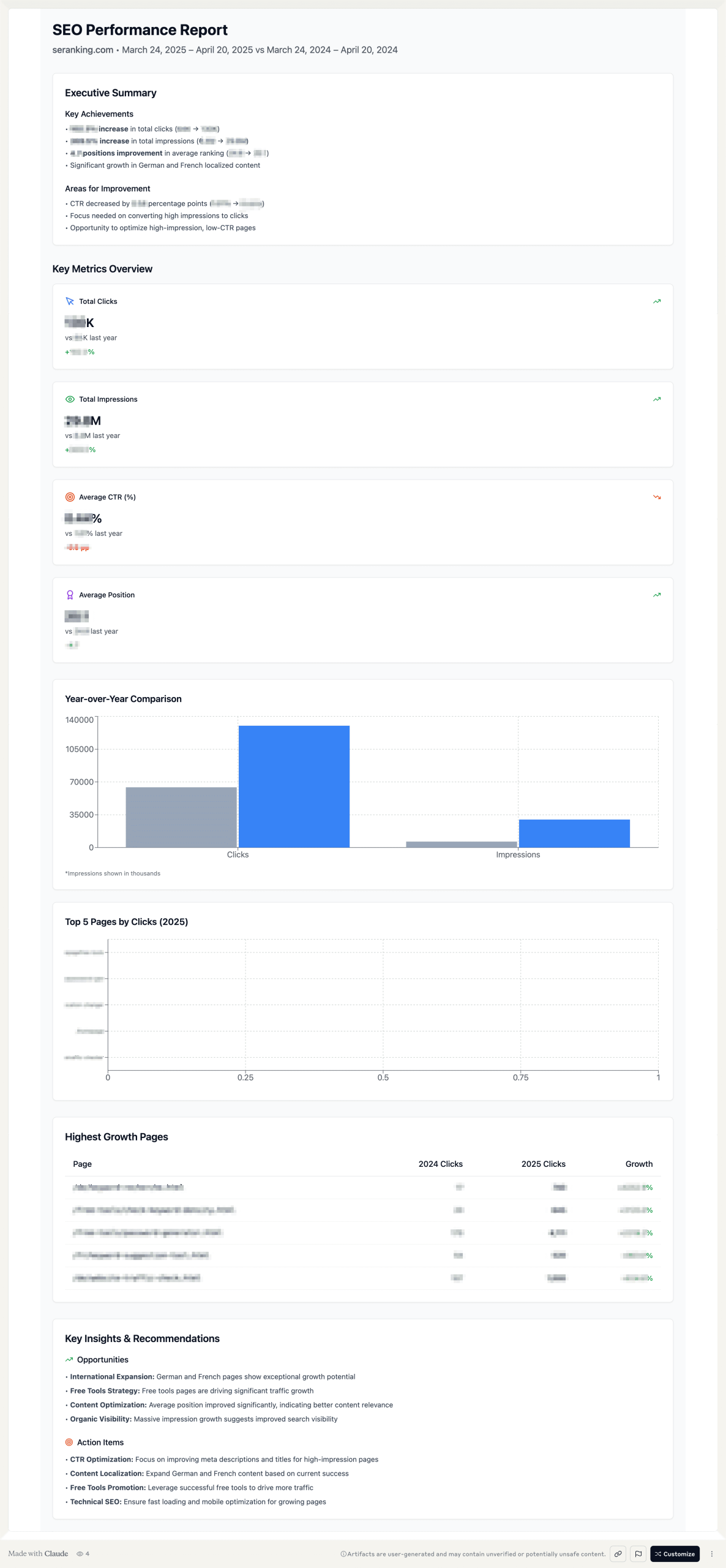
- ChatGPT, even in its top-performing version (o4-mini-high), provided accurate analysis but defaulted to a more text-heavy report. While the summaries were factually correct, they lacked the visual variety and immediate clarity seen in Claude’s version. The presentation felt drier and more technical, which could make it harder for non-specialists to interpret at a glance.
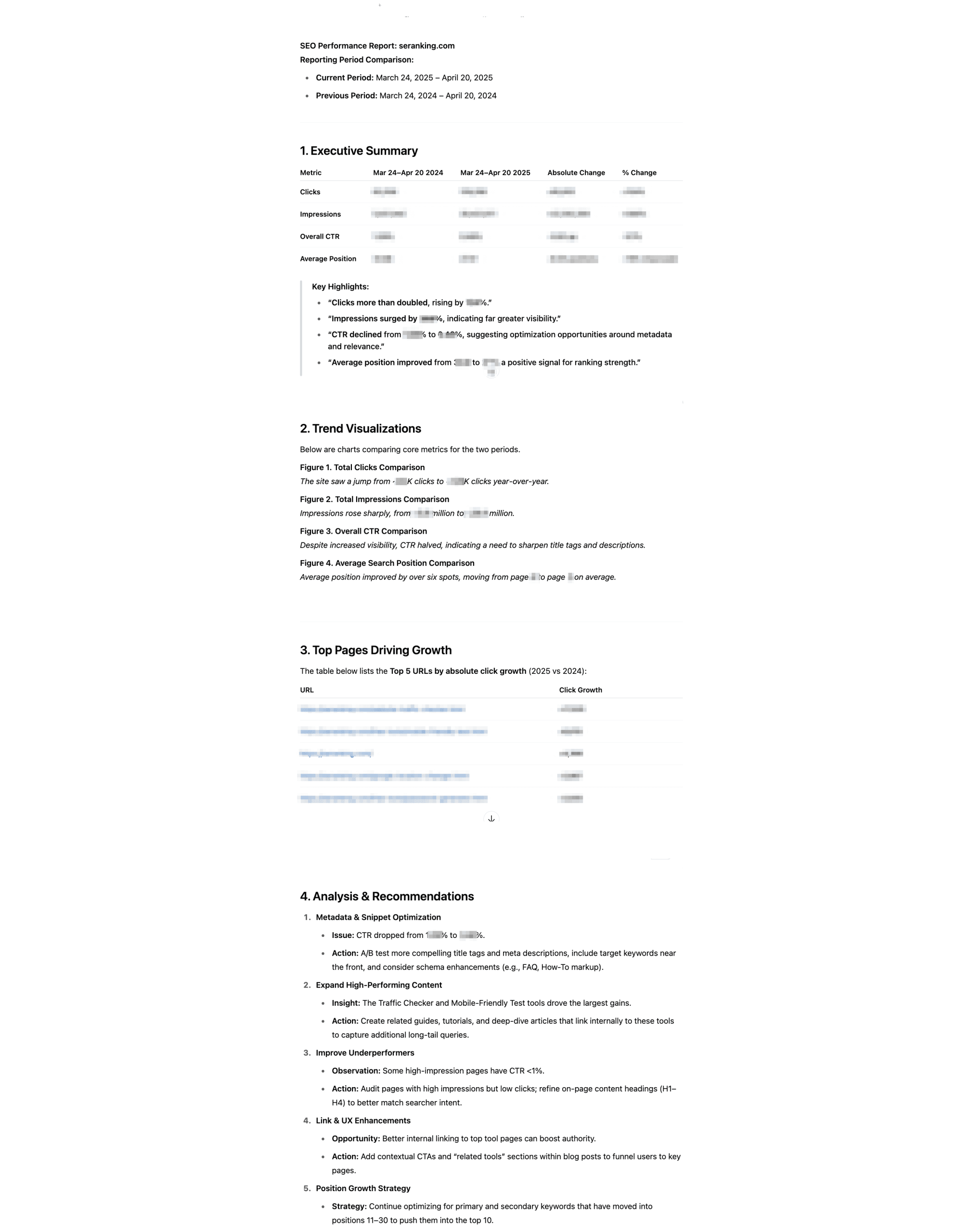
In summary, while both AI systems can analyze data reliably when provided, Claude stood out in delivering a more structured, visually rich, and presentation-friendly report. ChatGPT’s output was functionally solid but fell short in terms of accessibility and visual communication.
Still, neither AI should be blindly trusted for factual accuracy; always verify important data with your trusted SEO tools and your own expertise.
Creativity & writing quality
To test creativity and writing quality, we first asked AI tools to generate blog titles for the topic “SEO Trends and Strategies for 2025”. Claude and ChatGPT offered distinct outputs:
- Claude’s output heavily focused on subtopics like voice search SEO, local SEO, and mobile-first SEO. While the suggestions were informative, they leaned more toward niche insights and lacked general trends.
- ChatGPT’s output included references to AI and E-E-A-T, which are essential components of SEO in 2025. Overall, it was more aligned with the topic and reflected current priorities more effectively.
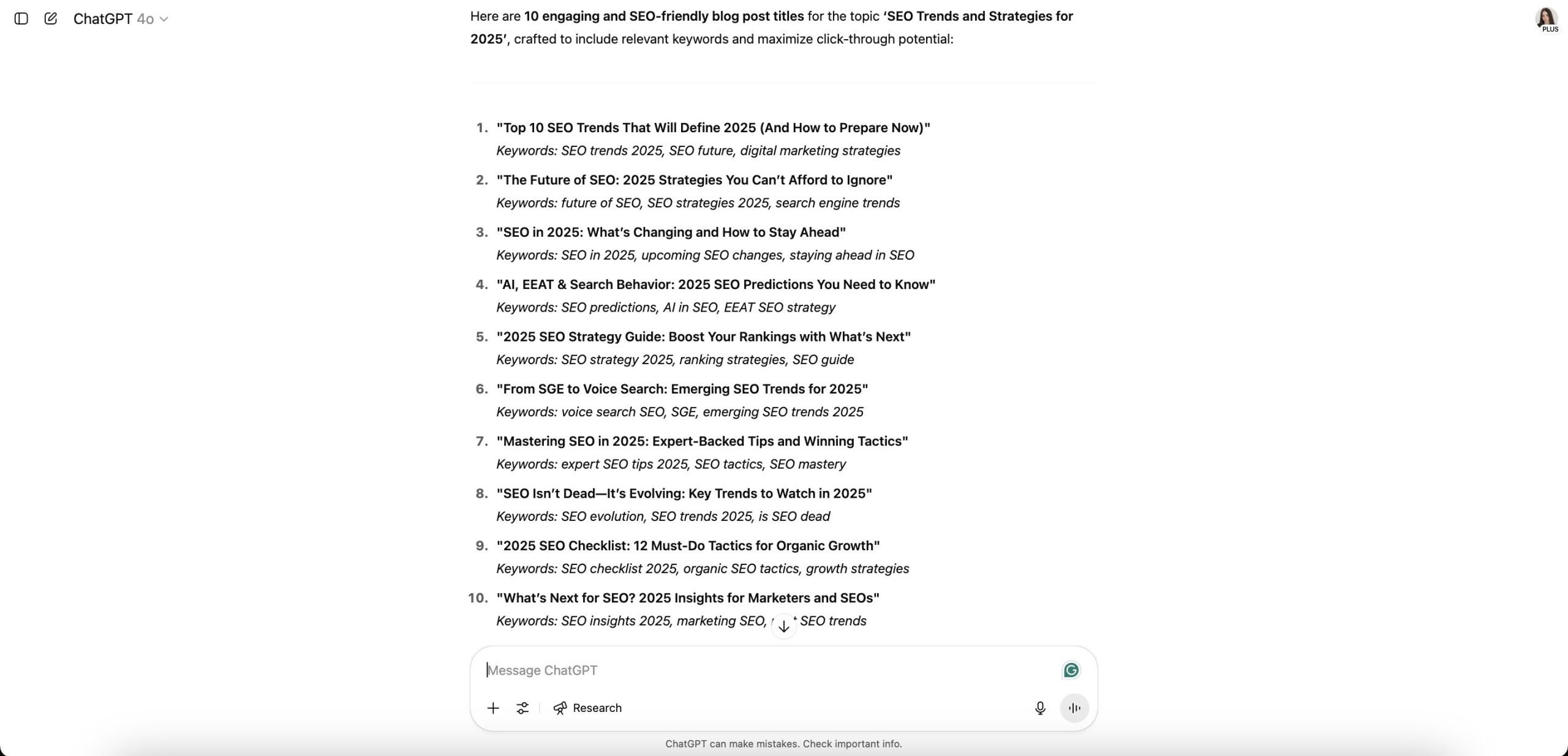
Creativity is arguably ChatGPT’s strongest suit. It has a knack for coming up with content that feels lively and human. Some of its options for the blog post title included: “Top 10 SEO Trends That Will Define 2025 (And How to Prepare Now)” and “SEO Isn’t Dead—It’s Evolving: Key Trends to Watch in 2025”. These titles have a bit of that click-worthy flair and a sense of style that might draw a reader’s attention.
Claude’s creativity is more measured. Its responses feel very informative and clear, which sometimes comes at the expense of a flashy hook or slogan-like text. This isn’t to say Claude can’t be creative (it surely can produce metaphors or creative examples if prompted), but its default style leans towards clarity, structure, and caution over boldness or flair.
We also tested how Claude AI vs. ChatGPT can create a content brief for a blog post titled “Best SEO Practices for E-commerce Websites”.
- Claude’s brief offered an impressively structured outline using a H2-H3 format and detailed each section with practical subtopics. It even included a suggested URL, meta tags, internal/external links, image optimization strategy, engagement elements, update/maintenance plan, and more. Basically, it felt like a professionally written editorial brief.
- ChatGPT’s brief focused more on keyword usage, internal linking, and detailed meta tags suggestions. It was also strong, particularly for keyword targeting.
Still, for truly effective SEO content planning, it’s best to pair either AI with SE Ranking’s Keyword Research Tool to ensure your topics and keywords are backed by real search data and competitive insights.
When generating longer-form content (like a paragraph or a section of an article), ChatGPT’s writing tends to flow naturally. It often uses a conversational tone, which is great for readability. It’s also quite adept at analogies or little creative touches that make content enjoyable. However, one thing to monitor is that if not guided properly, ChatGPT might produce text that sounds too generic or formulaic for seasoned readers. For example, it might start many articles with “In today’s digital age…” unless you steer it toward a more original angle.
In turn, Claude’s text is exceptionally coherent and well-organized. If you ask Claude to write a paragraph or two, it often creates a topic sentence, followed by supporting sentences, and maybe a concluding sentence. The benefit is that such text might require less heavy editing for structure, but you might want to liven it up if your brand voice is more casual or edgy.
Anyway, when it comes to creating content that not only reads well but also ranks well, general-purpose AI tools like ChatGPT and Claude often fall short compared to dedicated solutions like SE Ranking’s AI Writer. It’s specifically built for SEO-focused writing; it’s capable of generating keyword-rich titles, meta descriptions, intros, and even full paragraphs.
If you want a burst of imaginative ideas or a friendly, engaging tone, ChatGPT is your friend. It often produces the kind of copy that can spark excitement or interest. If you need clear, well-structured, and informative text, Claude delivers consistency and thoroughness.
For SEO content that needs to both rank and resonate, you might start with ChatGPT for the hook and outline, then use Claude to enrich the content or verify its completeness. Still, always remember to inject your unique angle and ensure the content aligns with your audience, since AI can only generalize based on training data.
Technical SEO capabilities & scripting
A common question among marketers and analysts is: is Claude better than ChatGPT for technical SEO?
The reality is that both ChatGPT and Claude offer strong capabilities in generating structured data, writing automation scripts, and analyzing large SEO datasets, but subtle differences set them apart in terms of accuracy, flexibility, and reliability.
To evaluate both models in a real-world use case, we tested their ability to generate Schema.org structured data (JSON-LD format) for a blog post.
In terms of accuracy, both were about on par. The core difference between Claude and ChatGPT was that the output of the first one was a little more clean (only one non-critical issue detected by Google’s Rich Results Test).
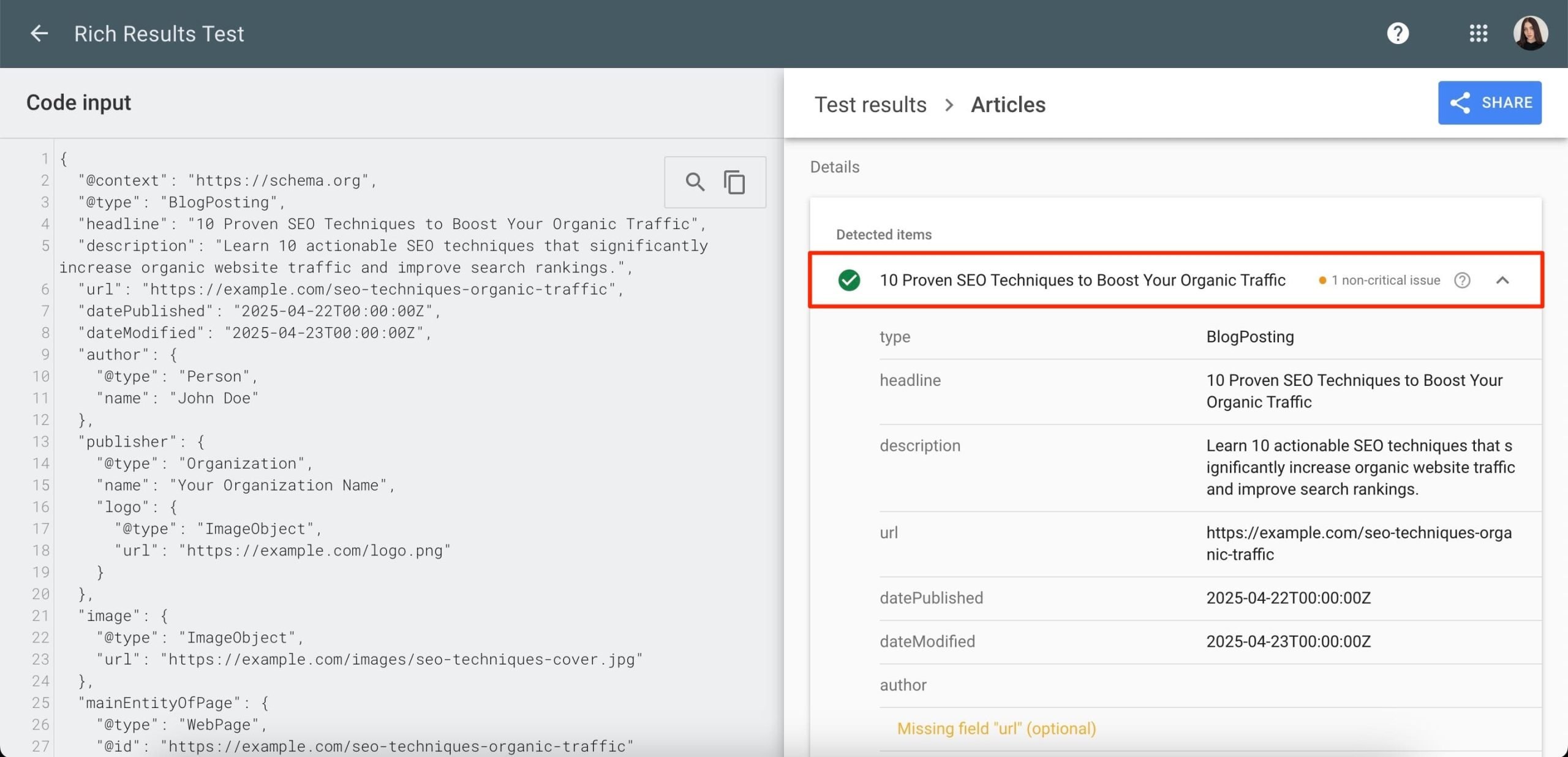
In turn, ChatGPT’s version generated five non-critical issues, mostly due to optional metadata fields.
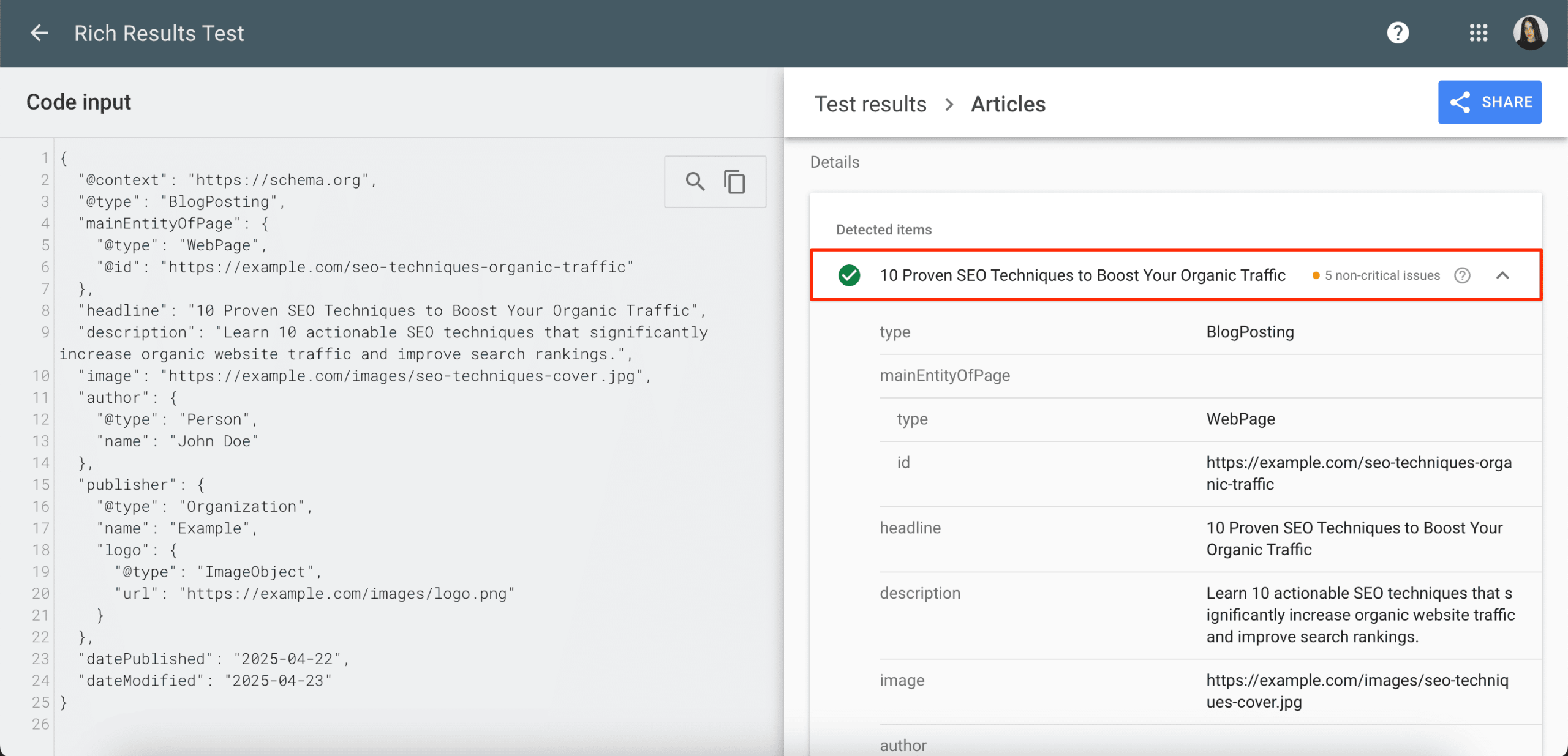
Claude’s JSON-LD included a better-structured publisher object (using a full logo path), a full timestamp for datePublished, and an ImageObject type for the image (slightly more aligned with Google’s structured data guidelines).
Here’s how Claude AI vs. ChatGPT handle other coding tasks related to SEO:
- SEO automation scripting (Python/JavaScript)
ChatGPT has a clear advantage here (especially its GPT‑4.1 model, which is optimized for coding tasks). Its Python and JavaScript coding abilities are generally more robust, accurate, and up-to-date. It can automate sitemap generation, crawl simulations, log analysis, and even generate code to connect with various APIs, including Google Search Console API.
Claude also performs well in scripting, but sometimes over-explains or adds unnecessary complexity. It is, however, more verbose in documentation within code, which can be helpful for beginners or team collaboration.
- Large SEO dataset analysis
Claude demonstrates superior capabilities when handling large SEO datasets and comprehensive analysis tasks. With its ability to process up to 500 pages of documentation in a single session, Claude excels at analyzing extensive SEO audit reports, competitor research documents, and multi-dimensional performance data.
Whichever model you use, it’s essential to validate AI-generated outputs. For example, using SE Ranking, you can perform a technical site audit to catch issues in structured data, crawlability, or site health after implementing AI-assisted changes.
Both tools performed well when generating schema markup code. However, Claude had a slight edge in overall quality. When tested using Google’s Rich Results Test, ChatGPT returned five non-critical issues (mostly related to optional fields) while Claude’s output triggered just one non-critical issue. These issues don’t affect eligibility for rich results, but Claude’s cleaner implementation suggests a better grasp of structured data best practices.
API & integration
ChatGPT provides a highly flexible and robust API that supports multiple models, including the latest GPT‑4.1 and GPT‑4o. The integration process is streamlined, with comprehensive documentation and SDKs available for various programming languages like Python and Node.js. Developers can take advantage of advanced features such as streaming responses, image and audio inputs, and the ability to plug in third-party tools via its plugin system. OpenAI also supports custom GPTs and fine-tuning.
Claude, in contrast, emphasizes simplicity and stability. Its API is designed primarily around conversational AI tasks, excelling in structured dialogue and long-context tasks such as summarization or document analysis. Claude’s endpoints are clean and straightforward, with strong support for embedding workflows and long-form content. Though it may lack some of the advanced multimodal capabilities of ChatGPT, it wins points for reliability and ease-of-use in more narrowly defined tasks.
When it comes to pricing, OpenAI offers a range of options:
Input
$2.00
Output
$8.00
Best For
Complex tasks, reasoning
Input
$0.40
Output
$1.60
Best For
Balanced speed + quality
Input
$0.10
Output
$0.40
Best For
Fast, cheap tasks
Input
$5.00
Output
$20.00
Best For
Real-time, multimodal AI
Input
$0.15
Output
$0.60
Best For
Fast, affordable tasks
Input
$75.00
Output
$150.00
Best For
Legacy high-end model (retiring)
Input
$150.00
Output
$600.00
Best For
Most powerful reasoning (very expensive)
Input
$2.00
Output
$8.00
Best For
Reasoning-focused tasks
Input
$1.10
Output
$4.40
Best For
Reasoning on a budget
Input
$20.00
Output
$80.00
Best For
Premium capability
$2.00
$8.00
Complex tasks, reasoning
$0.40
$1.60
Balanced speed + quality
$0.10
$0.40
Fast, cheap tasks
$5.00
$20.00
Real-time, multimodal AI
$0.15
$0.60
Fast, affordable tasks
$75.00
$150.00
Legacy high-end model (retiring)
$150.00
$600.00
Most powerful reasoning (very expensive)
$2.00
$8.00
Reasoning-focused tasks
$1.10
$4.40
Reasoning on a budget
$20.00
$80.00
Premium capability
Anthropic’s Claude models also present a structured pricing model:
Input
$0.80
Output
$4.00
Best For
Speedy, budget-friendly content tasks
Input
$3.00
Output
$15.00
Best For
Balanced power and cost – great for everyday SEO writing
Input
$15.00
Output
$75.00
Best For
Most advanced – ideal for high-stakes, long-form, or technical SEO content
$0.80
$4.00
Speedy, budget-friendly content tasks
$3.00
$15.00
Balanced power and cost – great for everyday SEO writing
$15.00
$75.00
Most advanced – ideal for high-stakes, long-form, or technical SEO content
For teams looking to enrich their data pipelines or reporting dashboards, SE Ranking’s API for SEO is a powerful option. For example, you could use the SE Ranking API to pull data (like a list of keywords your site ranks for, or a set of on-page issues), and then feed that into ChatGPT or Claude via their API to get a written summary or suggestions.
This kind of mash-up can produce very powerful custom reports, where the AI interprets the data for you and presents it in a narrative form.
In summary, both OpenAI’s ChatGPT and Anthropic’s Claude offer high-quality APIs with solid developer support, flexible integration paths, and scalable performance. OpenAI stands out for its comprehensive ecosystem and the broader community, while Claude brings a strong emphasis on safety and efficient batch performance. The right choice ultimately depends on your technical requirements, budget constraints, and preferred development style.
Claude vs. ChatGPT: Premium comparison
As advanced AI tools become central to productivity, creativity, and research, knowing what you’re paying for matters. Both Anthropic and OpenAI offer entry-level paid plans at $20/month (Claude Pro and ChatGPT Plus, respectively). But each shines in different ways.
Below is a detailed comparison of the two, followed by clear guidance on which premium AI tool is best for your needs.
Claude Pro (Anthropic)
$20/month
ChatGPT Plus (OpenAI)
$20/month
Claude Pro (Anthropic)
Claude 4 Sonnet and Opus
ChatGPT Plus (OpenAI)
GPT-4 (GPT-4-turbo)
Claude Pro (Anthropic)
Up to 200K tokens (~150K words)
ChatGPT Plus (OpenAI)
Up to 128K tokens (~100K words)
Claude Pro (Anthropic)
Fast, even with large documents
ChatGPT Plus (OpenAI)
Very fast with GPT-4-turbo
Claude Pro (Anthropic)
Text only (image input in dev preview)
ChatGPT Plus (OpenAI)
Text & image input supported
Claude Pro (Anthropic)
No persistent memory yet (as of mid-2025)
ChatGPT Plus (OpenAI)
Persistent memory & personalization
Claude Pro (Anthropic)
Handles large files with ease
ChatGPT Plus (OpenAI)
Accepts multiple file types
Claude Pro (Anthropic)
Good, especially in context-rich tasks
ChatGPT Plus (OpenAI)
Advanced, with code interpreter
Claude Pro (Anthropic)
Not available
ChatGPT Plus (OpenAI)
Available (in Plus with GPT-4)
Claude Pro (Anthropic)
None
ChatGPT Plus (OpenAI)
Tools like Python, DALL·E, Browsing
Claude Pro (Anthropic)
Long-form reading & comprehension
ChatGPT Plus (OpenAI)
Versatile: coding, research, images
Claude Pro (Anthropic)
More reserved and factual
ChatGPT Plus (OpenAI)
More conversational and creative
$20/month
$20/month
Claude 4 Sonnet and Opus
GPT-4 (GPT-4-turbo)
Up to 200K tokens (~150K words)
Up to 128K tokens (~100K words)
Fast, even with large documents
Very fast with GPT-4-turbo
Text only (image input in dev preview)
Text & image input supported
No persistent memory yet (as of mid-2025)
Persistent memory & personalization
Handles large files with ease
Accepts multiple file types
Good, especially in context-rich tasks
Advanced, with code interpreter
Not available
Available (in Plus with GPT-4)
None
Tools like Python, DALL·E, Browsing
Long-form reading & comprehension
Versatile: coding, research, images
More reserved and factual
More conversational and creative
To get the most out of OpenAI and Anthropic’s AI platforms, both companies also offer top-tier premium plans: Claude Max and ChatGPT Pro. Here’s how these flagship offerings compare:
Claude Max (Anthropic)
From $100/month
ChatGPT Pro (OpenAI)
$200/month fixed price
Claude Max (Anthropic)
2 options: 5× Pro usage at $100; or 20× usage at $200
ChatGPT Pro (OpenAI)
One standard tier with unlimited/priority access features
Claude Max (Anthropic)
Access to Claude 4 (Opus 4 and Sonnet 4), capable of hybrid reasoning, multi‑hour coding execution, and memory summaries
ChatGPT Pro (OpenAI)
Pro users get OpenAI o1, o3‑pro, GPT‑4.1 and GPT‑4.5 models with voice & multi‑modal features
Claude Max (Anthropic)
Opus 4 excels at long coding workflows, with top‑tier performance in SWE‑bench
ChatGPT Pro (OpenAI)
Powerful o‑series models for reasoning and code; excellent in language, tool use, multimodal integration
Claude Max (Anthropic)
Known for thoughtful, human‑like, emotionally aware responses; excels in interactive or learning scenarios
ChatGPT Pro (OpenAI)
Often faster and more direct; excels in quick tasks, polish, and creative narrative delivery
Claude Max (Anthropic)
Claude supports web search and its “computer use” interface to automate tasks
ChatGPT Pro (OpenAI)
ChatGPT Pro includes full access to chat‑based voice, image generation (DALL‑E), browser search integrated across models
Claude Max (Anthropic)
Long‑form writing, deep reasoning, programming marathons, memory/intelligent follow‑ups
ChatGPT Pro (OpenAI)
Quick generation, creative tasks, multimodal content (images, voice, search), plugin/API ecosystem
From $100/month
$200/month fixed price
2 options: 5× Pro usage at $100; or 20× usage at $200
One standard tier with unlimited/priority access features
Access to Claude 4 (Opus 4 and Sonnet 4), capable of hybrid reasoning, multi‑hour coding execution, and memory summaries
Pro users get OpenAI o1, o3‑pro, GPT‑4.1 and GPT‑4.5 models with voice & multi‑modal features
Opus 4 excels at long coding workflows, with top‑tier performance in SWE‑bench
Powerful o‑series models for reasoning and code; excellent in language, tool use, multimodal integration
Known for thoughtful, human‑like, emotionally aware responses; excels in interactive or learning scenarios
Often faster and more direct; excels in quick tasks, polish, and creative narrative delivery
Claude supports web search and its “computer use” interface to automate tasks
ChatGPT Pro includes full access to chat‑based voice, image generation (DALL‑E), browser search integrated across models
Long‑form writing, deep reasoning, programming marathons, memory/intelligent follow‑ups
Quick generation, creative tasks, multimodal content (images, voice, search), plugin/API ecosystem
Ultimately, choose Claude if you:
- Work with large documents (legal, academic, research).
- Prefer detailed, thoughtful answers and natural writing.
- Don’t need images or tools like browsing.
Alternatively, consider using ChatGPT if you:
- Want access to powerful tools (image input, Python, browsing).
- Use AI for coding, data analysis, or creative tasks.
- Appreciate customization and memory for ongoing projects.
Pricing comparison: Which AI gives more value?
When it comes to selecting the right AI assistant for SEO, understanding the cost-to-value ratio is key. Both ChatGPT and Claude offer tiered pricing plans, but the features they include differ in ways that matter depending on how you work.
ChatGPT starts with a strong free plan that includes limited access to the GPT-4o model. Even without a subscription, users can browse the web, perform basic file analysis, and interact with custom GPTs. However, more advanced SEO professionals will likely benefit from upgrading to one of the premium tiers:
1. ChatGPT Plus Plan ($20/month):
- Extended limits on messaging, file uploads, data analysis, and image generation
- Voice, video, and screensharing support
- Advanced models: o3, o4-mini, o4-mini-high
- GPT‑4.5 (its largest model) and GPT‑4.1 (great for coding)
2. ChatGPT Pro Plan ($200/month):
- Unlimited use of GPT‑4o and all advanced reasoning models
- Enhanced voice features, plus higher limits for video and screen sharing
- Access to o3‑pro, optimized for solving complex problems with more compute
- Extended capabilities for in-depth research and analysis
- Early access to Sora for generating AI-powered videos
- Access to a research preview of Operator and Codex agent
In contrast, Claude emphasizes simplicity and content productivity. Its free plan includes access to the Claude 3.5 Haiku model and is ideal for lighter tasks such as drafting blog outlines or summarizing reports. For users looking for more advanced features, Claude offers:
1. Claude Pro Plan ($20/month):
- 5x more usage than the free tier
- Unlimited Projects to manage conversations and files
- Advanced research capabilities
- Integration with Google Workspace (Docs, Gmail, Calendar)
- Expanded reasoning power for complex tasks, a wider range of Claude models for different needs
2. Claude Max Plan (from $100/month):
- Usage tiers offering 5x or 20x more than the Pro plan
- Increased limits across all task types
- Early access to cutting-edge Claude capabilities
- Priority service during peak usage periods
Both ChatGPT and Claude AI offer compelling free and paid plans. Your choice depends on your specific needs:
- Choose ChatGPT if you require advanced voice capabilities, deep research tools, and access to the latest OpenAI models.
- Choose Claude AI if you prefer a generous free tier with access to powerful models and a cost-effective upgrade path for additional features and collaboration tools.
Consider your usage patterns, required features, and budget to select the AI assistant that best aligns with your objectives.
When to use Claude vs. ChatGPT
Both ChatGPT and Claude are powerful tools, but each excels in different scenarios. Here’s a quick guide for SEO and digital marketing professionals on when to choose one over the other.
Use ChatGPT when:
- You need quick ideas and brainstorming. For early-stage content planning (like blog topics, email campaign ideas, or social media angles), ChatGPT delivers rapid, creative suggestions.
- You want snappy copy. ChatGPT shines at writing punchy headlines, meta descriptions, or CTAs. It adapts tone well — just say, “Make it more playful” or “more professional,” and it adjusts accordingly.
- You prefer a back-and-forth conversation. If you’re working through a problem or developing a strategy in real time, ChatGPT handles iterative, interactive queries smoothly. You can refine your prompts step by step and get tailored answers.
- You need concise responses. Despite its verbosity at times, ChatGPT often delivers shorter, more to-the-point replies when instructed, which is great for summaries or tight content formats.
Use Claude when:
- You’re working with long or complex inputs. Claude handles extensive context better, whether it’s a multi-page audit, a full content brief, or a lengthy meeting transcript. It can process and respond holistically without losing the thread.
- You need detailed analysis or explanations. Claude excels at delivering thorough breakdowns of technical concepts, like how Google indexes pages or diagnosing on-page SEO issues.
- You want a second opinion. After using ChatGPT to draft content, Claude can be your reviewer. It’s great for refining outlines or expanding ideas with a more analytical lens.
In short, ChatGPT is best for fast, creative, and interactive work, while Claude is ideal for depth, continuity, and comprehensive analysis.
Conclusion
Both AI tools have proven to be invaluable for SEO tasks, and choosing when to use Claude vs. ChatGPT is all about finding what’s best for your needs.
If you need an AI assistant for content generation, quick brainstorming, and engaging writing, ChatGPT is an excellent choice. If you need an AI that will meticulously sift through information and help produce detailed analyses or handle large inputs without breaking a sweat, Claude is remarkably powerful for that role.
In practice, many SEO professionals find that a hybrid approach brings the best results. You might use ChatGPT to generate a list of content ideas and then use Claude to expand one of those ideas into a thorough content brief. Or perhaps ChatGPT drafts a concise summary of an SEO report, and then Claude is used to elaborate on each point for the full report to the client.
By understanding the strengths of each, you can delegate tasks accordingly, much like you would distribute tasks among team members with diverse areas of expertise.

